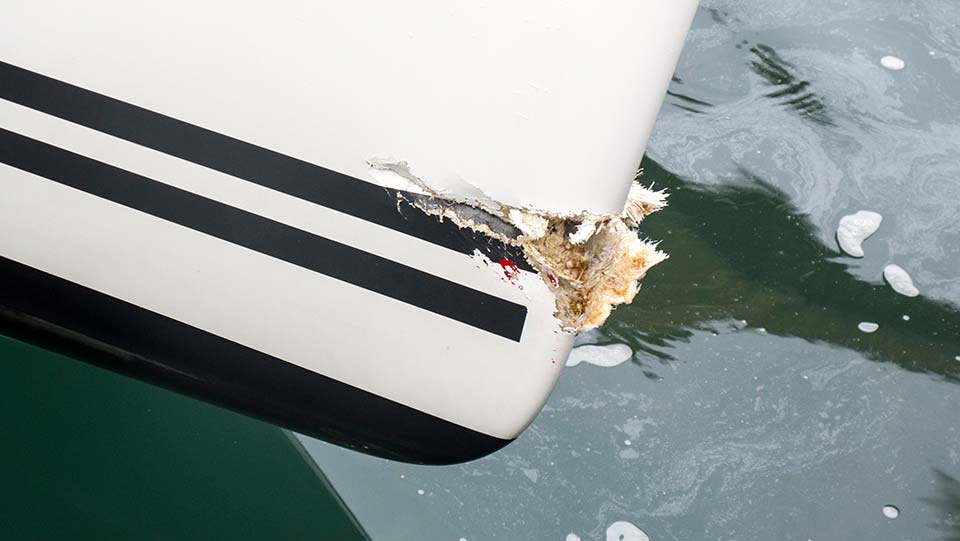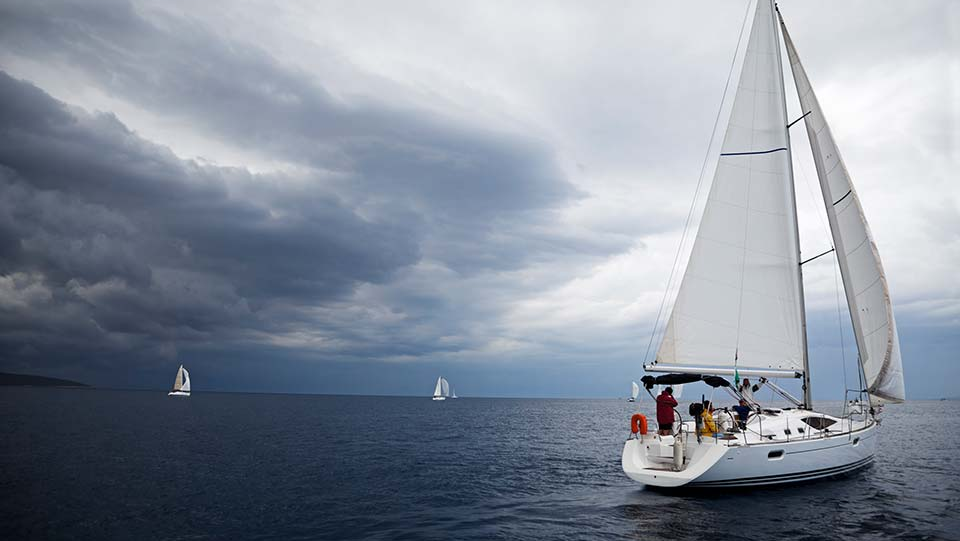Boat and Yacht Insurance FAQ
Travel protection is offered by our trusted partner, Travel Insured International, through InsuraMatch, LLC, a Travelers-owned insurance agency.
InsuraMatch
Pet insurance is offered by our trusted partner, PTZ Insurance Agency, Ltd through its ASPCA® Pet Health Insurance program via InsuraMatch, LLC, a Travelers-owned insurance agency.
InsuraMatch
Motorcycle insurance is offered by our trusted partner, Dairyland®, through InsuraMatch, LLC, a Travelers-owned insurance agency.
InsuraMatch
Flood insurance is offered by our trusted partner, Neptune Flood, through InsuraMatch, LLC, a Travelers-owned insurance agency.
InsuraMatch

We have the answers to your boat and yacht insurance coverage questions.
Boat and yacht insurance policy basics
Understand the fundamentals of boat and yacht insurance coverage, from what it protects and who can be included on your policy, to seasonal considerations and cost factors. This section answers essential questions about policy coverage, the benefits of choosing Travelers and more. Whether you’re a new boat or yacht owner or reviewing your existing coverage, this section provides guidance to help you make informed decisions about protecting your watercraft investment.
Boat and yacht insurance – sometimes referred to as marine insurance – is designed to help protect you and your boating guests from the potentially high cost of accident-related damages or injuries. It is a contract between you and your insurance company in which you pay a premium to the insurance company in exchange for a set of available coverages you select. If you finance or lease your watercraft, your lender may require specific insurance coverages and limits.
Carrying boat or yacht insurance is a smart decision. Contrary to popular belief, your watercraft is not automatically covered under your homeowners policy. If you cause an accident or get into one with an uninsured vessel, you may be held responsible to cover related expenses, such as repairs, property damage, medical bills and more. Without the proper coverage, your financial well-being could be at risk.
Working with an insurance representative to create a marine insurance policy that helps fit your individual needs and budget can help protect you, your loved ones and your assets in the event of a boating accident.
Boat and yacht insurance coverage options depend on the state where your watercraft is used, your insurance company and the coverage you choose. Standard boat and yacht insurance coverage options from Travelers typically include:
- Physical damage: Collisions with another boat or submerged object.
- Liability: Bodily injury or damage to the property of others.
- Personal property: Including, but not limited to, fishing equipment, clothing and boating-related equipment such as life vests.
- Towing and assistance: Reimbursement for transportation of your watercraft to a repair facility when it’s inoperable, and for gas delivery and roadside assistance.
To get the most complete protection for your individual needs, discuss available boat and yacht insurance coverage options with your insurance representative.
Boat or yacht insurance coverage provides protection to any operator listed on your policy. Your policy may offer some protection for operators not listed on your policy whom you occasionally allow to use your watercraft, such as:
- Extended family
- Other permissive operators you occasionally allow to use your watercraft
It is important to note that marina or maintenance personnel do not have liability coverage while operating your boat or yacht. Check with your insurance representative to learn more about who needs to be included and who is covered on your boat or yacht insurance policy.
Before you purchase a boat or yacht policy, it is a good idea to talk to an insurance representative who can help you determine your insurance needs and explain your coverage options. Things to consider and discuss with your agent include:
- What are the basic coverages, if any, required by your state or by your lender (if watercraft is financed)?
- Will you be able to afford to pay your deductible and expenses above your policy limits in the event of a loss?
- How much would it cost to replace or repair your watercraft, its fixtures and electronic equipment in the event of a loss?
- Do you frequently take people out on your boat or yacht?
- Do you have special features on your boat or yacht that might need extra protection?
- Where do you store your boat or yacht when it’s not in use?
- How do you transport your watercraft?
- Where do you plan to use your watercraft?
- Do you qualify for any discounts on your premium?
Once you purchase a boat insurance policy, it is important to review your coverage needs with your insurance representative on an annual basis, or whenever there is a major change in the status of your watercraft or its use (e.g., you renovate your boat, yacht or other vessel or change its storage location), to ensure that your policy remains adequate for your needs and budget.
Choosing a boat or yacht insurance policy that fits your needs starts with choosing your insurance company.
Travelers has been an insurance leader, committed to keeping pace with the ever-changing needs of our customers, for over 170 years. As one of the nation’s largest casualty companies, we offer insurance solutions with policy options and packages designed specifically for watercraft owners. Through our approach, we can offer excellent coverage at a competitive price while addressing several aspects of watercraft ownership. Our highly qualified insurance representatives are available to help you select coverages with your needs and budget in mind.
We understand that having insurance is about more than protecting your watercraft. It’s about making the process after any incident as simple and stress-free as possible. As your watercraft insurance provider, we’re here to support our customers when the unexpected occurs – with fast, efficient claim services provided by marine insurance specialists available 24 hours a day, 365 days a year.
Getting a boat or yacht insurance quote from Travelers is easy – you can get a quote online, contact one of our insurance representatives or reach out to your independent agent. For yacht insurance, please contact your independent agent to discuss your coverage needs and get a personalized quote.
Your watercraft’s location – both where it’s stored and where you use it – can significantly impact your insurance premium. Storage and docking location matter because watercraft kept in areas prone to severe weather events typically cost more to insure. In these high-risk regions, you may also face a separate windstorm deductible. Additionally, some states and marinas require specific coverages and limits, which can affect your rates. The navigation territory, or where you operate your watercraft, is equally important for pricing. Inland waterway usage generally results in lower premiums compared to coastal waters. These geographic factors, along with your watercraft’s specifications and your personal details, can help determine your final insurance cost.
A boat or yacht is a major investment and one that should be protected year-round. Fire, theft, weather and natural disasters can damage your watercraft anytime, anywhere. Without adequate coverage, your watercraft remains exposed to these threats all year long. Your insurance representative can help you determine which boat or yacht policy options best fit your needs and budget.
As long as you continue to meet eligibility requirements, most boat or yacht policies renew each year for your convenience, helping to ensure continuous protection for your watercraft. Typically, you are notified about any policy or premium changes in advance. It is important to review your coverage needs with your insurance representative on an annual basis, or whenever there is a major change in the status of your watercraft or the personal belongings you keep on it. This helps ensure that your boat or yacht policy meets your needs and budget.
You can update your coverages and boat or yacht policy limits by speaking to your insurance representative. Typically, you will be notified and your payments adjusted accordingly. Note that making changes to your policy can affect your premium.
Remember, it’s important to review your coverage needs with your insurance representative on an annual basis, or whenever there is a major change in the status of your watercraft or the personal belongings you keep on it. This helps ensure that your policy meets your needs and budget.
Umbrella insurance is a separate, personal liability policy that can provide an additional layer of protection beyond what your boat and yacht insurance policy may provide. The cost of damages for which you may be personally responsible after a serious incident involving your vessel can quickly add up to exceed the limits on your boat or yacht policy. Umbrella insurance can provide extra protection in these cases and is a valuable addition to any insurance portfolio, particularly if you have many assets to protect. Talk to your insurance representative to see if an umbrella policy is right for you.
Boat and yacht insurance premiums and discounts
Travelers offers various ways to help make your boat or yacht insurance more affordable while providing the protection you need. Your premium can be influenced by your watercraft type, usage and coverage selections. Many boat and yacht owners can qualify for discounts through multi-policy bundling, security features, safe boating practices and payment options. Learn more about boat and yacht insurance pricing, savings opportunities and coverage considerations.
Boat and yacht insurance premiums vary based on factors like your watercraft’s type, size and value, plus how and where you use it. Your boating experience and claims history also can affect pricing. Policies can be purchased with flexible payment options in all states where coverage is offered. A Travelers representative or independent agent can help you understand specific pricing and potential discounts to help you select coverage that fits your budget.
You may be eligible for discounts based on factors like:
- Your level of boating education.
- Your boat’s safety and security features.
- You insure more than one watercraft with Travelers.
- You have another policy, such as car, homeowners, renters, condo or umbrella insurance, with Travelers.
- How and when you pay your premium.**
Ask your insurance representative about these and other incentives to help ensure that you are getting all the boat or yacht discounts for which you are eligible.
**Discounts not available in all states, including CA.
Discounts can be available when bundling qualified policies. Ask your insurance representative about our multi-policy discount.
In many cases, having a GPS unit, radar or other security and safety devices installed on your boat or yacht can qualify you for savings. Ask your representative for more information about this and other boat or yacht discounts for which you may be eligible.
With Travelers, if you qualify you get to choose whether to insure your watercraft for the “agreed value” or “actual cash value.” Agreed value provides coverage at an agreed amount in case there is a total loss to the watercraft. Actual cash value provides coverage at the depreciated value and can earn you savings on your premium.
A deductible is the amount of money you pay out of pocket before your boat or yacht insurance kicks in. Typically, the higher your deductible, the lower your premium. To help keep monthly premiums low, boat or yacht owners and operators can opt for higher deductibles. Please note, a higher deductible will result in higher out-of-pocket costs in the event of a covered loss. It’s important to choose a deductible you can afford in the event of a loss. Contact your insurance representative for more information about deductible options.
A policy limit (or limit of liability) is the maximum amount your insurer will pay for any claim covered under your policy. It’s important to choose a liability limit that meets your needs. You will be responsible to pay causally related accident expenses above your policy limits. Contact your Travelers representative or independent agent for more information about your policy limits and options.
Travelers boat and yacht insurance typically provides physical damage protection for the essential components of your watercraft. This coverage helps safeguard your vessel’s hull, motor/engine, propeller and lower unit against risks such as collisions, severe weather, theft, vandalism and underwater hazards. Contact your Travelers representative or independent agent to better understand the specific coverage details for your watercraft’s components and any optional coverages that might enhance your protection.
Travelers boat and yacht insurance typically extends coverage to others operating your watercraft with your permission, subject to the terms and conditions of your policy. It’s recommended to check with your Travelers representative or independent agent to make sure other operators of your watercraft are covered under your policy.
If your boat or yacht sinks, Travelers boat and yacht insurance with physical damage coverage typically helps cover the costs of salvage operations and repairs to your vessel, subject to your policy terms and deductible. Contact your Travelers representative or independent agent immediately after a sinking incident to report the claim and receive guidance on next steps. While recovery and restoration efforts will be explored, the outcome may vary depending on circumstances such as water depth, vessel condition and other factors.
Boat and yacht insurance coverage and limits
Travelers offers a range of boat and yacht insurance options to help protect your watercraft and personal property both on water and land. From liability protection and physical damage coverage to specialized options like towing assistance and trailer coverage, your policy can be customized to address your boating needs. Review the questions below to help you better understand the coverage and protection you need.
When selecting boat or yacht insurance coverage limits, consider several key areas:
- Physical damage coverage provides protection if your watercraft collides with another vessel or submerged object, such as a log or a rock. Consider what it would cost to repair or replace your watercraft when choosing your deductibles and policy limits.
- Liability coverage helps protect you if you’re legally responsible for injury to others or damage to their property. Consider your assets and potential exposure when selecting liability limits.
- Additional coverages may include personal property, medical payments and uninsured boater coverage. Evaluate your specific needs for each.
- If you finance your vessel, your lender may require specific coverage options and limits. Discuss your coverage needs with your Travelers representative to help ensure adequate protection. Remember, you’re responsible for covering your deductible and related costs above policy limits.
Personal property damage coverage provides protection for items on your boat or yacht, including clothing and other personal belongings. It is included in most boat and other marine policies. Discuss your personal property coverage needs with your insurance representative. Consider the items you and your guests often bring aboard your vessel and how important it is to protect them when choosing your policy deductibles and limits.
Towing and assistance coverage generally reimburses the cost to transport your watercraft to a repair facility in the event it is inoperable due to a covered loss and can also cover gas delivery (but not the gas itself) and “boatside” assistance if you are stranded. It is included in most boat or yacht policies.
Discuss your towing and assistance coverage needs and reimbursement levels with your insurance representative to ensure that you have adequate protection.
Liability coverage helps protect your assets and financial well-being if you are found legally responsible for causing property damage or injury to other people while operating your watercraft. In most cases, it includes coverage for bodily injury, property damage and legal expenses. It is included in most boat or yacht policies.
When choosing the level of protection that’s right for you, consider your risk tolerance and financial circumstances. Then discuss your liability coverage needs, options, deductible and policy limits with your insurance representative.
Transport coverage depends on where and how you’re transporting your watercraft. If using a contract or common carrier for hire, coverage for damage applies within a 500-mile radius from your summer mooring ZIP code, including loading and unloading, as long as the trip remains within this area. This protection is extended to dinghies on yacht policies, too. If you use your own trailer without a contract or carrier, the 500-mile limit does not apply. Note that your boat, yacht or dinghy is not covered when transported as waterborne cargo, including loading and unloading.
The typical boat or yacht insurance policy covers your watercraft while it’s in water or on land. Whether a particular loss is covered depends on the specific facts and the provisions, exclusions and limits of the actual policy.
If you have the applicable endorsements on your boat or car insurance policies, the trailer you use to tow your boat may be protected. Your insurance representative can help you determine which policies and options are best to insure your trailer.
In most cases, both. Boat policies typically include the coverage limits you select for damage to auxiliary equipment and personal property stored and used on your boat, as well as to the vessel itself.
Liability coverage is included in most boat and other marine policies. Liability coverage provides protection if you are found legally responsible for causing injury to another person while operating your boat.
In most cases, both. Boat and yacht policies typically include the coverage limits you select for damage to auxiliary equipment and personal property stored and used on your watercraft, as well as to the vessel itself.
A deductible is the money you pay out of pocket before your boat or yacht insurance policy kicks in. For example, let’s say your watercraft collides with a submerged rock, you have a policy limit of up to $10,000 and your deductible is $1,000. If the cost to repair your watercraft is $500, you will be responsible for the entire $500 since it is less than your deductible. If the cost to repair your watercraft is $8,000, you will be responsible for your deductible of $1,000 and your insurer will cover the remaining $7,000 subject to your policy terms and conditions.
While selecting higher deductibles can help manage your monthly boat or yacht insurance premiums, it’s important to choose amounts you could comfortably pay if needed. Consider your financial situation carefully when selecting both deductibles and coverage limits, as you’ll be responsible for the deductible amount and any expenses that exceed your policy limits.
Consider your risk tolerance and financial circumstances when deciding the level of protection that’s right for you and your family – then work with your insurance representative to create a policy that balances your individual needs with a premium and deductible you can afford.
It’s important to review your coverage needs with your insurance representative on an annual basis, or whenever you make “after-market” modifications to your watercraft, to ensure that your policy remains adequate for your needs and budget.
More about boat or yacht insurance
Boat and yacht overview
Keep your family, friends and watercraft protected. Get an insurance quote today.
What's covered
Our insurance policies offer broad coverage. Choose coverage that’s right for you.
Ways to save
Bundling policies and taking safe boating courses can save you money on boat or yacht insurance.
Prepare & Prevent
Insights to help you manage risks at home and on the road
Safe Boating Resources
What Should I Do if My Boat Is Damaged?
A damaged boat can be frustrating and costly. Learn what to do in the event of boat damage to help ensure passenger safety and more with these tips.

Safe Boating Resources
When Is the Best Time to Buy a Boat?
Are you considering a boat purchase? The following questions can help you decide if you're ready to take the helm.

Safe Boating Resources
Developing a Storm Preparedness Plan for Your Boat: Tropical Storms and Hurricanes
A boat in a storm can be very dangerous. Learn what to do if you are on a boat in a storm with these tips.
